The year 2021 signals great challenges and possible results due to the efforts of countries in the process of fighting for peace, stability and prosperity in the East Sea.
The US adjusts its strategy
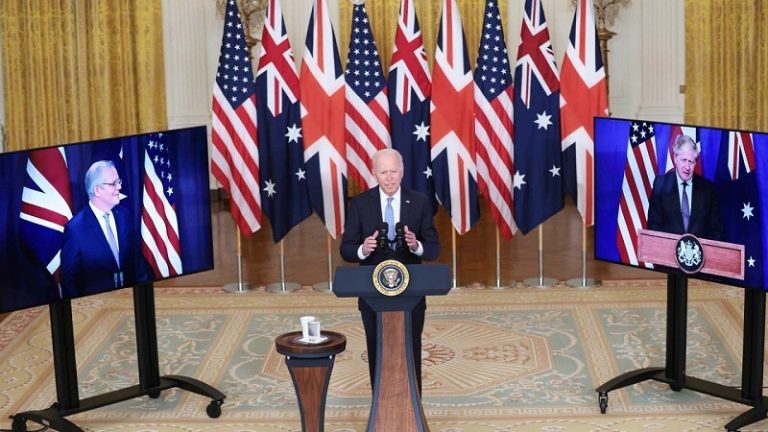 |
|
The US adjusted its global strategy, and established the Australia – United Kingdom – United States military alliance (AUKUS). |
The year 2021 marked the transition to a new administration in the US and the adjustment of US and Chinese strategies towards each other. On March 3, the White House released the Biden administration's Interim National Security Strategic Guidance.
There are five new points in this strategy: Firstly, many challenges and threats to security are transboundary and require collective action. Secondly, democracies around the world are facing many challenges.
Thirdly, the balance of power in the world has changed, creating many threats. Regarding major powers, China is the only rival that is capable of combining economic, diplomatic, military and technological power to pose a serious, lasting challenge to the stable and open international system. Russia still wants to increase its global influence. Both China and Russia are working to contain American influence.
Fourthly, the alliances, institutions, laws and standards that underpin the international system are being challenged. Fifthly, the technological revolution is creating both challenges and opportunities.
The US pursued its foreign policy with China under the Donald Trump administration with some adjustments in strategy. The US has replaced Trump's view of China as a "top strategic competitor" to "the fiercest strategic competitor", "the biggest geopolitical challenge facing the US in the 21st century".
However, during the Joe Biden - Xi Jinping online meeting in mid-November, the US better defined the competition between the two countries: "Our responsibility as leaders of China and the United States is to compete frankly and must ensure that competition between the two countries does not lead to conflict, whether intentional or unintentional."
The US national security strategic guideline emphasizes several points that warrant this frank competition.
That is: by consolidating internal strength, especially the strength of democracy, the US will win the strategic competition with China; ensure that the US, not China, sets the global agenda; deter Chinese aggression; protect the common spaces, including the exercise of freedom of navigation and overflight in accordance with international law; commit to supporting Taiwan but respecting the One China policy; emphasize that the US will not sacrifice the values in economic relations with China and will continue to protect democracy and human rights.
The US does not put itself first, but restores relations with allies and expands the alliance to encircle China, shifts the focus of competition to the areas where the US has strengths and can attract support from others.
The Biden government is in no hurry to scrap the former administration's trade policy. The US continues the policy of increasing taxes, monitoring technology transfer and punishing Chinese companies for violations. The US has re-adjusted its global strategy, from fighting terrorism to focusing on limiting China's ascent by withdrawing troops from Afghanistan, establishing the AUKUS.
China adopts National Security Strategy
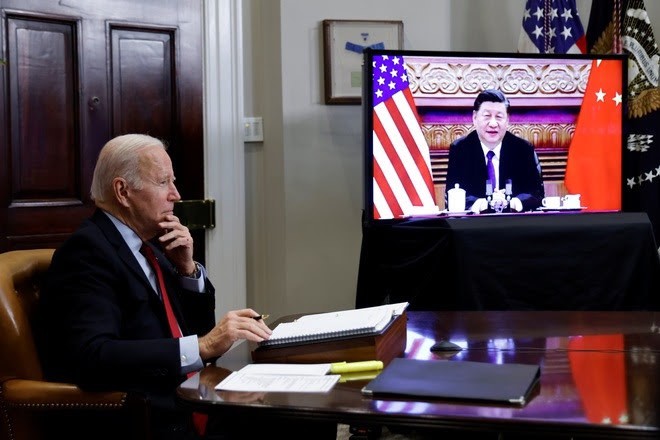 |
|
President Joe Biden and President Xi Jinping met online on November 15 (US time). Photo: Reuters
|
A day after the Biden-Xi Jinping summit, the meeting of the Politburo of the Central Committee of the Communist Party of China on November 18 adopted the National Security Strategy (2021-2025). The strategy assessed that China is having "a period of important strategic opportunity to make good use of its advantages, the overall external environment is favorable".
China considers national security in an overall strategy, including political security, economic security, social safety, science and technology security, domestic security and foreign security; putting political security as the top priority, for the first time considering scientific and technical self-reliance as national security; determining to not compromise, drawing red lines in relations with the US and its allies (although not naming) such as absolutely not giving in to core interests of the nation, honor of the people, resolutely protecting the nation's sovereignty, security and development interests.
China also proactively raised the issue of "establishing a common, comprehensive, cooperative and sustainable global security, strengthening cooperation in the security field, maintaining a stable global strategy, and joining hands to respond to global challenges and promote the building of a community of common destiny", affirming the Chinese mainland's position in building a rules-based international order according to Chinese standards, rejecting Western standards and adopting the slogan "community with common destiny" on a global scale, not with neighboring countries or the region.
The new national security strategies of the US and China show that China is confidently rising to great power status by 2035 or 2049, eager to build a new world order by its own standards, rejecting the world order that America and the West want to maintain.
The East Wind is blowing the West Wind!
Peer-to-peer competition
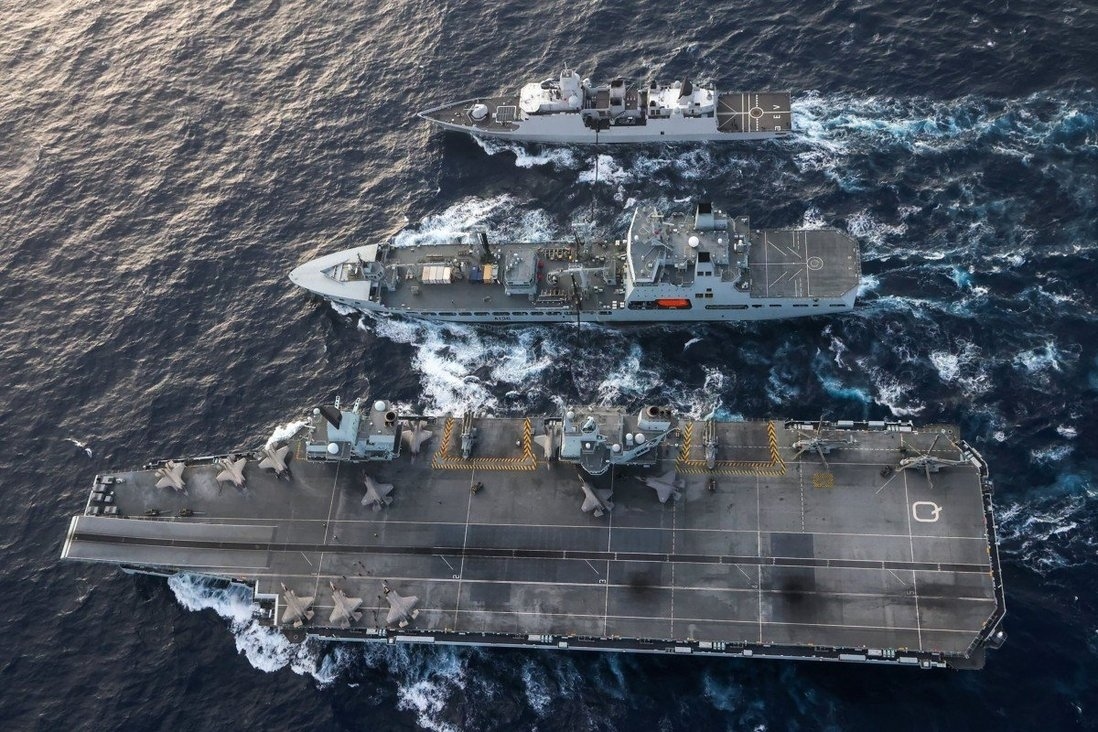 |
|
British aircraft carrier HMS Queen Elizabeth participated in joint exercises with US Navy ships in the East Sea in early August.
|
China takes advantage of the economic recovery while other countries are grappling with the Covid-19 pandemic to enforce a policy of peer competition with the US. Firstly, they believe that their economy will surpass the US. In 2017, China's GDP was equivalent to 63% of the US and it increased to 70% in 2020.
With a population of only one-fifth of China, despite its higher per capita income, the United States cannot prevent China from catching up and surpassing its GNP in the future. China will be able to spend more on defense.
Secondly, Beijing confidently demands that the international order be changed in its favor, gradually introducing the standards and regulations of China's version of international law.
Thirdly, it makes the most of its economic power to entice other countries. China has demonstrated that strength and confidence through wolf warrior diplomacy, vaccine diplomacy, chairing many international conferences and initiatives, issuing "red line" requirements to the US, asking other countries to respect China's core interests, and proposing to divide the Pacific Ocean with the US.
In this competition, both sides make the most of their advantageous weapons. The US uses the US dollar and the global financial system, political alliances, military and technological competition as offensive weapons. China exploits the advantages of the world's largest market, large foreign currency reserves and the ability to quickly centralize decision power. Beijing approved the "Belt and Road" initiative and applied to join the Comprehensive and Progressive Agreement for Trans-Pacific Partnership (CPTPP) in response to the US.
However, the two countries still need each other in solving global problems such as terrorism, climate change, disease prevention and stability for development. The US-China competition is not a cold war 2.0, nor can it lead to a hot war, but a state of both competition and cooperation for the purpose of competing for world domination in the future.
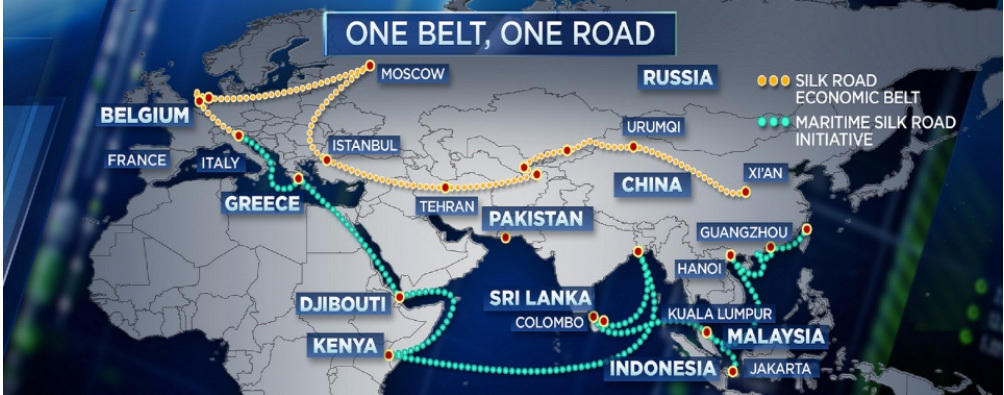 |
|
China's "Belt and Road" Initiative.
|
The US-China relationship strongly affects the situation in the East Sea. China's new National Security Strategy indirectly classifies the East Sea as "absolutely not giving in to matters of core interests of the nation and the honor of the nation, resolutely safeguarding sovereignty and security and development interests of the country”.
This will be the basis for them to continue their absolute dominance in the East Sea, eliminating the interference or presence of the outsiders, then the countries involved.
The US is also determined to defend its values and its allies in the East Sea. Although China's growth rate is high, the quality of its economy, science and technology, and military force is still not enough to surpass that of the US.
The US upholds a rules-based order, condemns acts of "force creates justice", establishes military alliances, strengthens freedom of navigation patrols, prolongs the visiting forces agreement (VFA) – which regulates the presence of US troops in the Philippines; and expresses the desire to upgrade relations with a number of countries in the region.
Nguyen Hong Thao
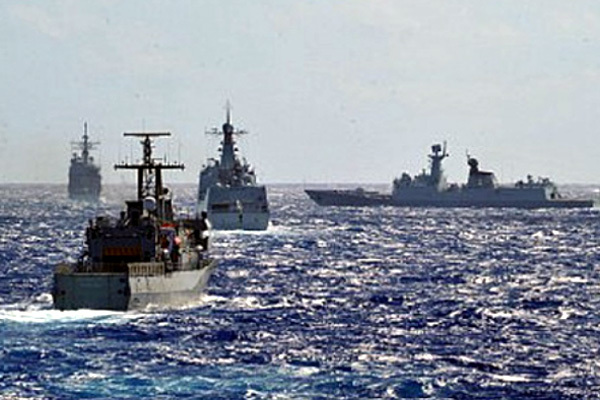
Five years of PCA's ruling: no such thing as ‘power creating justice’
The Permanent Court of Arbitration (PCA)'s ruling has been an irrevocable part of history. It will act as a “guide” for countries involved in the struggle for an order based on rules and not on “force creating justice.”
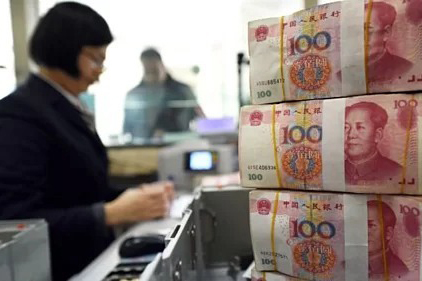
The essence of China's 'soft power'
American expert on international relations Joseph Nye said that the power of a country, besides "hard power" including military force, population, geography, and strategic resources, also includes "soft power".